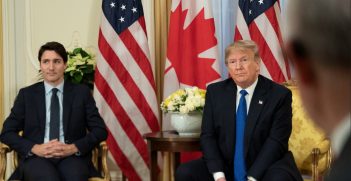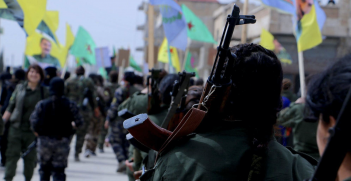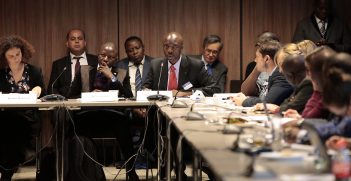Is Bashar al-Assad the Future for Syria?

Government forces appear to be close to a military victory in Syria after almost seven years of chaos and anarchy. But after a relentless and brutal war, has the optimism of its Arab Spring been forgotten?
Wither the Syrian opposition?
The seven-year Syrian conflict appears to now be in its final stages. According to ex-US Ambassador Robert Ford, who served in Syria for the years leading up to the 2011 crisis. The Bashar al-Assad government has won the war militarily and Ford cannot see any prospect of the Syrian opposition being able to compel Assad to make concessions in any negotiation. The end of 2017 also saw other experts like Robert Fisk as well as UN officials confirming more or less the same message and suggesting that the Syrian opposition give up. In retrospect, Aleppo was a most significant loss in December of 2016 and reflected the changing fortunes of war under a hail of Russian bombs and chemical attacks. If Russian warplanes did not drop chemical bombs, they certainly facilitated these international crimes.
The Syrian conflict was, in essence, decided by the untimely intervention of Iranian-backed Hizbollah forces and Russian air power. In 2015, the Assad regime was in grave danger of falling. His exhausted forces were bailed out by foreign ground forces and air power. In reality, the Iranians had been assisting the regime since the beginning of the conflict by providing police and cyber war techniques to round up peaceful activists and send them to their grisly demise.
In defeat, Syria’s regional importance takes on a new meaning. Iran has been empowered by the Syrian crisis to wage war against the Gulf Sunni regimes and create a land link to the Mediterranean sea. Iran emerges from the conflict newly empowered to take on the Saudi regime with support to the Houthis in Yemen and reinforcing their hegemony in Lebanon. Russia successfully defended its Mediterranean naval assets at Tartous in Latakia Province and Putin has revived nostagia of the former Soviet Empire despite a standoff in the Ukraine. Before Syria, Russia was a bit player in the Middle East. Now, it is a king-maker. How did this come about?
America’s regional decline continues
US foreign policy on Syria and in the Middle East region reflects a serious malaise as articulated by Presidents Obama and Trump. More than anything else, they are responsible for the increase in Iranian and Russian influence. Incoherence, missed opportunities, nombrilisme, domestic election paralysis and hijinks, inability to enforce red lines on dictators like the chemical weapons scandal effectively defined the absurd Obama policy of leading from behind.
Ironically, the only real foreign policy success of Obama, the P5 nuclear agreement with Iran, was promptly scuttled by Trump. This measure has allowed Iran and Russia to further prevail in the region while challenging the Gulf Sunni nations. Of course, the recent decision by the Trump administration to relocate the US Embassy to Jerusalem almost begs the question of whether America leading from behind was a less noxious policy than the present mindless flailing at wind mills (the North Korea issue for example). For the foreseeable future, Trump’s America will not be leading anything in this region of the world. The US has burned its bridges and thus eliminated themselves from any Syrian diplomatic solution to say nothing of the Arab-Israeli conflict. From the invasion of Iraq to the present, the first portion of the 21st century in the Middle East has been an American-made nightmare inflicting countless casualties on the innocent and guilty alike.
The Europeans have done little better. One has only to look at their duplicitous conduct on the issue of Catalonian independence. It is not surprising that French President Macron is ready to sell the Syrian opposition down the river by suggesting that Bashar should participate in the transitional phase. The Syrian opposition should adopt an attitude of utmost skepticism when faced with European peace initiatives or suggestions.
What is to be done?
Now, Lenin’s ‘What is to be done?’ is foremost in the minds of the Syrian opposition and their friends abroad. The struggle for freedom and justice against the Assad regime will continue, albeit on different levels and with unequal intensity. If Assad believes his temporary victory has effaced the years of suffering and opposition, once again his arrogance and lack of strategic vision and probity will be his ultimate undoing.
The Syrian opposition now has to focus on three new levels of activity and struggle: diplomatic, ideological and military.
The diplomatic struggle
The end of the conflict has now shifted the issue to the diplomatic level. What should the Syrian opposition do at the peace table? What objectives should it promote? There is one constant that ought to guide the opposition throughout any negotiations—count only on yourselves. The West has simply lost its way and is ready to sacrifice Syrian independence and freedom at the altar of political expediency.
For the opposition, Assad’s inclusion in any political transition could only be accepted if it can be organised with sufficient external and internal brakes on Assad’s military might. The departure of all foreign fighters from Syria would facilitate this objective. On his own, and reliant exclusively on his Alawite brethren, the Assad regime is a shadow of itself.
The Syrian opposition also needs to establish cells and diplomatic bureaus in key UN countries in order to prevent Assad from regaining any semblance of diplomatic credibility. The opposition needs to press forward with war crimes investigations in every political space including the United Nations to ensure that the Assad regime is under persistent international fire and the truth of the victims is exposed to all.
The ideological struggle
Blind struggle is no struggle at all. This is the bitter lesson in defeat for the Syrian opposition. From now on, the struggle must become more focused and its ideological orientation is part of that liberating process. The strategy of relying of radical Islamic factions and Gulf intermediaries has not worked and impeded the international diplomatic and outreach work now required.
The opposition needs to practice an open door policy for Syrian minorities and Kurds who oppose the Assad regime. They need to bring more of them into the opposition camp and put those who can be trusted in positions of authority. Syrian nationalism is a powerful force especially amongst the youth and should be a value for which the opposition stands. Many of the Syrian minorities are nationalists. By moving off of radical Islam, practicing outreach and espousing the nationalist cause, the democratic opposition will improve its chances for victory.
The military struggle
Is the conflict really over? At present, the Assad regime is exhausted and is fully reliant on foreign forces to maintain itself. On the other hand, the Syrian opposition needs time to regroup, after all, the transition must be owned by the Syrians themselves if we are to hope for a free and democratic Syria. The conflict may be over for the moment, but activism and dissidence can and must continue. Bashar al-Assad and his associates are war criminals and no amount of arm twisting from foreign forces can change that.
In areas like Idlib, and other pockets of support, the Syrian opposition needs to defend what it has. If this means making a pact with Turkey, so be it. The Syrian Turkmen—allies of the opposition—can assist in establishing this delicate balance with the Turkish state, who continue to keep a hand in the conflict ostensibly to protect these Turkic groups.
In areas where the regime has prevailed, the opposition must go underground to survive. Its weapons are many including cyber warfare and non-violent means such as a general strike. One chapter, albeit an important one, is now over in Syria. New chapters will be written. With a coalesced coherent democratic opposition reliant on itself, the struggle against oppression in Syria can continue. Given the grievous toll of Arab and Syrian lives lost at the hands of the Assad regime and its foreign friends, there can be no surrender. Only further struggle. Venceremos.
Dr Bruce Mabley is the director of the Mackenzie-Papineau Group think tank based in Montreal devoted to analysis of international politics. He was formerly a Canadian diplomat and served in Turkey at the beginning of the Syrian civil war.
This article is published under a Creative Commons Licence, and may be republished with attribution.





